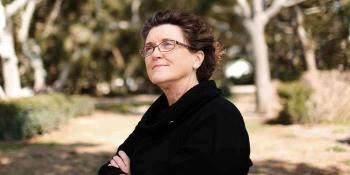Karen Willis Amspacher

The Working Waterfront Festival Community Documentation Project
This project documents the history and culture of the commercial fishing industry and other port trades. The project began in 2004 in conjunction with the Working Waterfront Festival, an annual, educational celebration of commercial fishing culture which takes place in New Bedford, MA. Interviewees have included a wide range of individuals connected to the commercial fishing industry and/or other aspects of the port through work or familial ties. While the majority of interviewees are from the port of New Bedford, the project has also documented numerous individuals from other ports around the country. Folklorist and Festival Director Laura Orleans and Community Scholar and Associate Director Kirsten Bendiksen are project leaders. The original recordings reside at the National Council for the Traditional Arts in Maryland with listening copies housed at the Festival's New Bedford office.
Karen Willis Amspacher is a dedicated advocate for the working waterfront community of Harker’s Island, North Carolina, where she was born and raised. She is the founder of the Core Sound Waterfowl Museum and Heritage Center, an institution that celebrates and preserves the local traditions of boat building and decoy carving. Amspacher's family has a long history in boat building, and she has worked tirelessly to support and develop new markets for local seafood. She is also actively involved in addressing the challenges of gentrification and regulations that impact her community.
Scope and Content Note
This interview with Karen Willis Amspacher, conducted by Madeleine Hall-Arber on September 27, 2013, provides an in-depth look at the working waterfront community of Harker’s Island, North Carolina. Amspacher discusses the local traditions of boat building and decoy carving, the challenges posed by gentrification and regulations, and her efforts to develop new markets for local seafood. She also talks about the role of the Core Sound Waterfowl Museum and Heritage Center, which she founded, in preserving these traditions and educating the public. Amspacher shares her insights on the changing dynamics of the fishing industry, the importance of direct and niche markets, and the impact of politics on working waterfronts. The interview offers a valuable perspective on the social and cultural characteristics of fishing communities, the loss of infrastructure, and the evolution of gear and fishing technology.
Please Note: The oral histories in this collection are protected by copyright and have been created for educational, research and personal use as described by the Fair Use Doctrine in the U.S. Copyright law. Please reach out Voices@noaa.gov to let us know how these interviews are being used in your research, project, exhibit, etc. The Voices staff can help provide other useful resources related to your inquiry.
The NOAA mission is to understand and predict changes in climate, weather, oceans, and coasts, to share that knowledge and information with others, and to conserve and manage coastal and marine ecosystems and resources. The Voices Oral History Archives offers public access to a wide range of accounts, including historical materials that are products of their particular times, and may contain offensive language or negative stereotypes.
Voices Oral History Archives does not verify the accuracy of materials submitted to us. The opinions expressed in the interviews are those of the interviewee only. The interviews here have been made available to the public only after the interviewer has confirmed that they have obtained consent.
